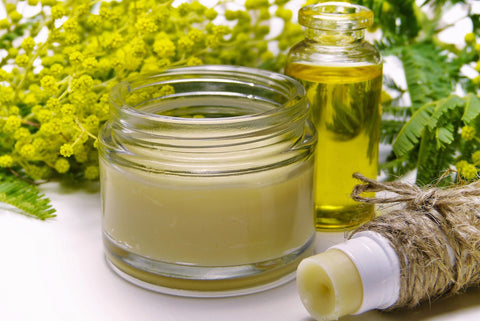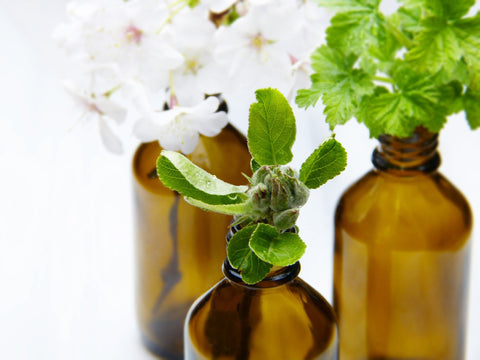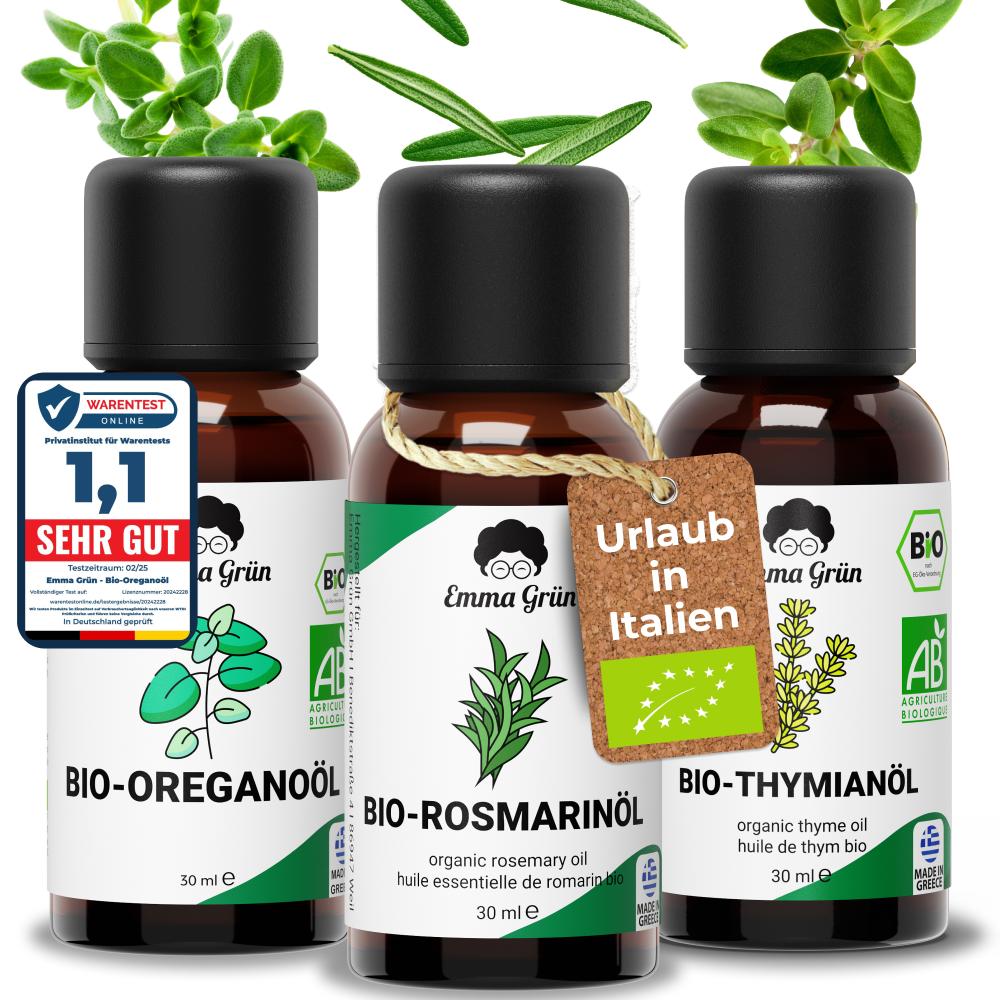Oregano oil has established itself as one of the most versatile natural remedies in recent years. Known for its characteristic scent and taste, oregano is now valued not only in the kitchen but also increasingly in the field of natural medicine.
The uses of oregano oil range from improving skin health to supporting the immune system , with it often being referred to as a natural antibiotic . This fact is based on its powerful antimicrobial properties, which make it an effective agent against a wide range of bacteria and fungi.
However, the effects of oregano oil go far beyond its antibacterial properties. Studies have shown that it can also have a positive effect on mental health , making it an interesting topic in modern aromatherapy .
In the following article, we will take a closer look at the various uses and effects of oregano oil and explain why this oil has taken on such a central role in modern naturopathy.
What is oregano oil?
Oregano oil is extracted from the leaves and flowers of the oregano plant ( Origanum vulgare ). It contains compounds such as carvacrol and thymol, which are known for their antibacterial, antiseptic and disinfectant properties. This is precisely why the essential oil is increasingly used in natural medicine.
The healing power of the ingredients, which are extracted from the medicinal plant using a gentle steam distillation process in an extremely complex process, have a positive effect on the human body in many ways. As a natural antibiotic, oregano oil is not only used to treat cold symptoms.

Due to its antimicrobial effect, the medicinal herb also achieves positive results in bacterial infections in the respiratory tract or ears. In addition, its anti-inflammatory and antioxidant properties make the super herb a popular ingredient in skin care products. Not only does it actively work against acne, but it also has a soothing effect on skin irritations and helps protect it from environmental damage.
Oregano oil is also a valued natural product in aromatherapy, which is often used to reduce stress-related symptoms due to its calming and balancing properties. But what effect does oregano have on the human body and how can the healing powers of oregano be used in everyday life?
What effect does oregano oil have on the body and what are its possible uses?
As already mentioned, oregano oil contains a variety of healing substances that have a positive effect on human well-being. Starting with aromatherapy , in which the pleasant scent has a relaxing effect on the psyche, through to targeted use for physical complaints, the areas of application are as varied as the effects of the various ingredients. The following applications promise healing and relaxation for body and soul :
- Natural antibiotic alternative: Due to its powerful antimicrobial properties, oregano oil is often used as a natural antibiotic for bacterial infections. The antibacterial and antiviral properties of oregano oil have a healing effect on respiratory infections and other health problems.
- Antifungal Uses: Oregano oil is effective against a variety of fungi and is often used to treat fungal infections , including nail fungus and athlete's foot.
- Support of the immune system: Oregano oil strengthens the human immune system and is used in natural medicine to prevent and treat colds and other respiratory diseases
- Digestive aid: Oregano oil as well as fresh and dried oregano are traditionally used to relieve digestive problems such as flatulence, indigestion and cramps.
- Oregano oil for the skin: Due to its anti-inflammatory and antimicrobial properties, the essential oil is also used in skin care. The essential oil achieves excellent results, especially in the treatment of acne, skin infections and to soothe irritations. However, it should always be diluted with a carrier oil, as it is very concentrated and can cause skin irritation.
- Aromatherapy: In aromatherapy, oregano oil is valued for its calming and balancing properties and helps reduce stress and tension . To use the oil for aromatherapy purposes , add a few drops to a diffuser that will spread the aromatic scent throughout the room. You can also enjoy a relaxing bath with oregano oil to relieve stress and unwind after a busy day.
- Improved indoor climate: Oregano essential oils can help purify indoor air and eliminate unpleasant odors. Oregano oil has antimicrobial properties that help reduce germs and bacteria in the air. You can dilute oregano oil with water and use it in a spray bottle to freshen and purify your indoor air. This is especially useful in enclosed spaces or during the cold season when windows are less open.
- Natural preservative: In the food industry, oregano oil is used as a natural preservative to extend the shelf life of products and inhibit the growth of microorganisms.
- Household cleaners: As a natural cleaner, oregano oil is often used in environmentally friendly cleaning products due to its antimicrobial properties .
- Insect repellent: Oregano oil can also be used as a natural alternative to chemical insecticides as it is effective against various types of insects. This is because oregano contains essential oils that have a strong smell. This scent can repel insects such as aphids, flies and mosquitoes. You can plant oregano in your garden to reduce the chances of insect infestation.
Even though essential oil occupies a top place in natural medicine, there are a few things you should keep in mind when using it.
How do you use oregano oil and what should you pay attention to when dosing it?
Oregano oil is a natural remedy , so it is safe for most people to use. However, the oil should never be applied to the skin or taken orally in its pure form, but should always be diluted with a carrier oil such as coconut oil, jojoba oil or almond oil.
Naturopaths also recommend that treatment to combat rashes or fungal infections should always be targeted and carried out over a foreseeable period of time. Furthermore, a skin compatibility test should always be carried out before external use. Although oregano is a medicinal herb, it can trigger allergies in some people. That is why we recommend that you test the essential oil beforehand on a part of your skin, such as the crook of your arm.
If you take it orally, make sure you dilute the essential oil sufficiently. One drop of oregano oil should contain 20 times the base oil. For inhalation, just a few drops are enough.
When should the use of oregano oil be avoided?
The use of oregano oil, especially in dietary supplements or as an essential oil, should be done with caution in pregnant and breastfeeding women and in people who are taking medication. The following should be noted:
- Use during pregnancy: Oregano oil may affect uterine muscles , which may increase the risk of irregularities during pregnancy, so pregnant women should discuss use with a healthcare provider beforehand.
- Use while breastfeeding: There is limited research on the effects of oregano oil on breastfeeding mothers and their babies. Since essential oil can be transferred through breast milk, it is advisable to avoid oregano oil while breastfeeding or consult a doctor.
- Drug interactions: Oregano oil can interact with certain medications. Caution should be exercised especially with blood thinners , diabetes medications, and anti-inflammatories , as the oil can affect the effects of these medications.
Important: For pregnant or breastfeeding women, as well as for people who have to take medication regularly, it is always advisable to seek medical advice before using oregano oil or other essential oils.
Oregano in the kitchen: healthy & aromatic!
Oregano is rich in essential oils and aromatic substances. This combination gives it its intense aroma and aromatic taste . You can use fresh or dried oregano leaves when cooking. Oregano goes perfectly with tomato dishes, vegetables, meat and fish. The aromatic flavors of the medicinal herb also complement other herbs such as basil, rosemary and thyme.
Oregano is a versatile herb that is used in many cuisines around the world. Here are some ideas and tips on how you can use the aromatic herb in the kitchen:
- Italian dishes: Oregano is a staple ingredient in Italian cuisine. It goes fantastically with tomato sauces, pizzas, pasta and Italian meat dishes.
- Greek recipes: In Greek cuisine, oregano is often used for meat marinades, especially lamb or chicken, as well as for fish dishes.
- Bread and rolls: Oregano can be added to dough for bread or rolls to give them a Mediterranean flavor.

- Salad dressings: Fresh or dried oregano adds an aromatic note to dressings.
- Barbecue marinades: Oregano is great for marinades and spice blends used in barbecues. It goes particularly well with grilled vegetables and meat.
- Soups & Stews: A touch of oregano can add a flavorful depth to soups and stews.
- Herb butter & dips: Oregano can be added to herb butter or various dips, including tzatziki.
- Oregano to refine oils & vinegar: Oils and vinegars infused with oregano are culinary secret weapons. They give salads and dressings a special touch and lend them a Mediterranean flair . A dressing with oregano oil, lemon juice, garlic and honey can turn your salad into a real taste experience . Try it out!
When cooking with oregano, you should remember that it tastes more intense when dried than when fresh . Therefore, we recommend that you adjust the amount accordingly. Oregano adds a warm, slightly bitter note to dishes that harmonizes particularly well with other Mediterranean herbs such as basil, thyme and rosemary. Be creative, create your own herb mixture and give your homemade creations a special touch.
Buying oregano oil: What you should pay attention to!
To ensure that you can benefit from the full power of the remedy, you should consider a few important things when purchasing. Because not all products contain what they promise! The following factors should be taken into account when making your purchase decision:
- Purity: Make sure the oil is 100% pure and contains no additives or diluents. Pure oregano oil should only consist of the extract of the oregano plant.
- Origin: Check where the oregano was grown. High-quality oregano often comes from regions with an optimal climate, such as the Mediterranean or specific areas in North America.
- Carvacrol content: Carvacrol is a key component in oregano oil that is responsible for many of its health benefits. A high carvacrol content is usually above 70% and is considered an indicator of a high-quality oil .
- Extraction method: Oregano oil should be extracted through steam distillation as this method ensures the quality and purity of the oil and helps preserve the important active ingredients.
- Organic certification: Always choose an organic certified product. This guarantees that the oil was produced without the use of pesticides or artificial fertilizers .
- Packaging: Oregano oil should be packaged in a dark glass bottle. Light can affect the quality of the oil and reduce the stated shelf life.
- Labeling and information: The product label should clearly reflect information about the ingredients, concentration, recommended use and any warnings.
- Price: Be careful with cheap offers. High-quality oregano oil is often more expensive than run-of-the-mill products due to the extraction process and the purity of the ingredients.
Important: Be aware that oregano oil is very strong and can cause skin irritation if used improperly. It should always be diluted and used according to the manufacturer's instructions. If you wish to use oregano oil for health purposes and are pregnant, nursing, or taking medication, we recommend that you consult a doctor or qualified health professional before using it topically or orally.
Making oregano oil yourself: Is it possible?
You can also make oregano oil yourself. However, the result is more likely to be an oregano-infused oil . Essential oils are usually extracted through steam distillation, a process that is difficult to do at home. The infused oil, on the other hand, is easier to make and can be used in the kitchen or for topical applications . In the following instructions, you will learn how to do it:
Ingredients:
- Fresh oregano
- Carrier oil of your choice (olive oil, coconut oil, jojoba oil)

Directions:
- Prepare oregano: Rinse the fresh oregano under running water. It should now dry. If using fresh oregano, the leaves should be removed from the stems.
- Chopping: To release the oils, the leaves are now lightly chopped.
- Heat the oil: Next, heat the carrier oil slightly. Make sure you don't let it boil.
- Add oregano: Now add the chopped oregano to the warm carrier oil.
- Infusion: Let the mixture infuse over very low heat for about 1-2 hours. Be careful not to let the oil boil or get too hot, as this can affect the properties of oregano.
- Cool and strain: Now the oil needs to cool. Then strain the oregano leaves. Use a fine-mesh sieve or a cotton cloth.
- Storage: Finally, you just need to pour the oil into a clean, dark glass bottle. It should also be stored in a cool, dark place.
Infused oregano oil can be used for skin care or to flavor a variety of dishes . Making infused oil is relatively easy. However, keep in mind that the product does not have the same concentration or potency as commercially produced oregano essential oil.
Conclusion: Oregano - a multi-talent
Oregano is definitely more than just a spice. It is a versatile herb that can play an important role in cooking, healthcare, gardening, aromatherapy, and even art and culture. The possibilities for using this herb are almost endless.
FAQs about Oregano
1. Can I dry and store fresh oregano?
Yes, you can dry fresh oregano by hanging the leaves in a dry place or drying them in the oven at a low temperature. Store the dried leaves in an airtight container.
2. Are there different types of oregano?
Yes, there are several different types of oregano, including classic Greek oregano, Mexican oregano, and more. Each variety has its own flavor and uses.
3. Can oregano help with stomach problems?
Yes, oregano can help with stomach problems, especially due to its anti-inflammatory properties. A tea made from oregano can have a calming effect.
4. How do I care for oregano in my garden?
Oregano needs well-drained soil and plenty of sunlight. Make sure you water it regularly and remove the dead leaves.
5. Can I use oregano oil for skin care?
Yes, oregano oil can be used for skin care, but it should always be diluted with a carrier oil as it is very concentrated and can cause skin irritation.
Sources
- Smith, J. (2022). Oregano is a plant that contains herbs and spices. Journal of Culinary Herbs, 10(3), 45-58.
- Müller, A. (2021). Oregano: health benefits and uses. Gartenpraxis, 15(2), 78-89.
- Schmidt, M. (2020). Oregano in naturopathy. Naturopathy Journal, 7(4), 102-115.
- Gartenverein, D. (2019). Cultivation and care of oregano in the garden. Gartenpraxis, 14(1), 32-41.
- Insektenforschung, R. (2018). Oregano as a natural insect repellent. Journal of Insect Research, 5(2), 67-74.
- Health and Herbs, L. (2017). The healing power of oregano oil. Herbal Medicine, 12(3), 22-35.



